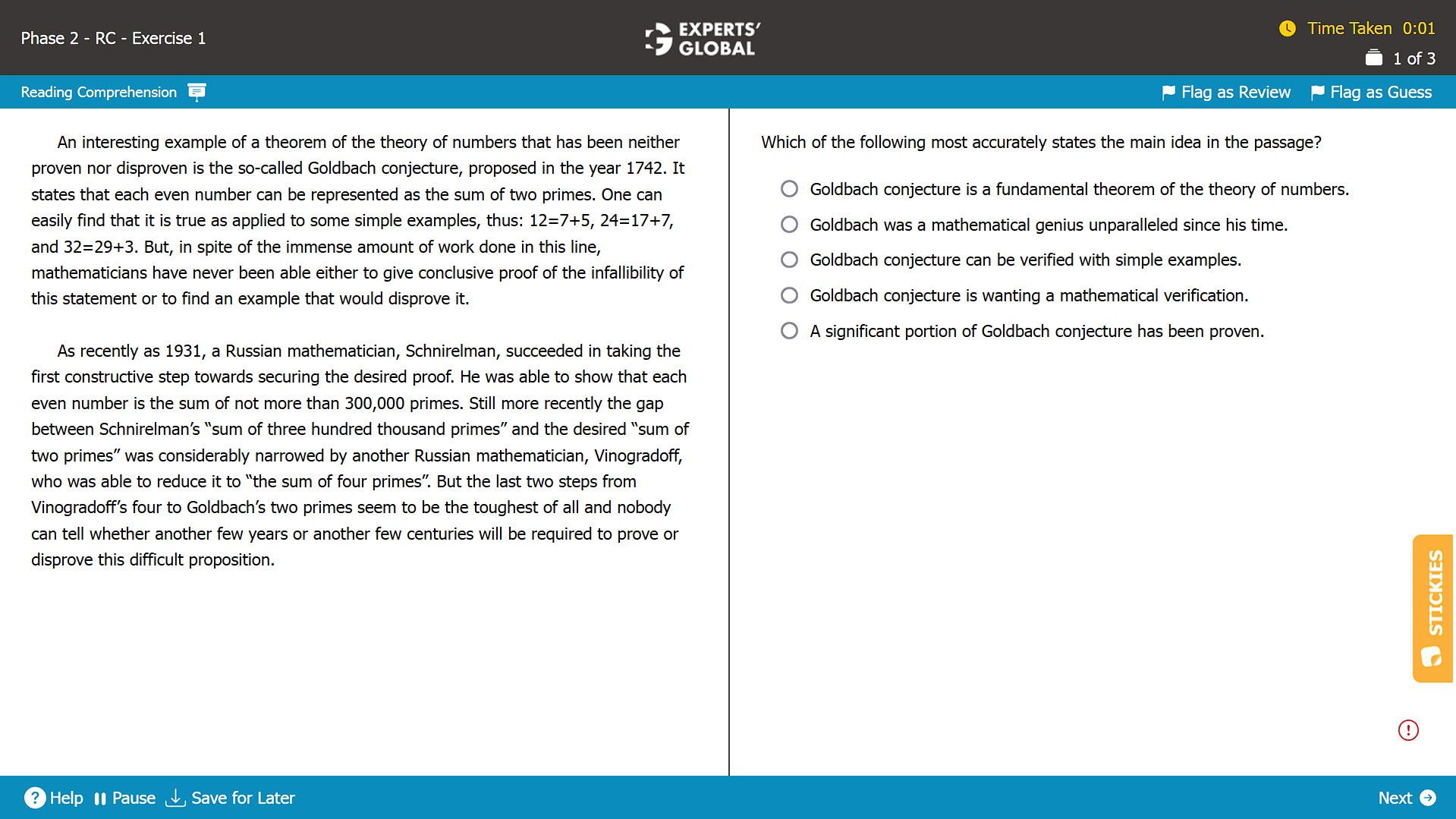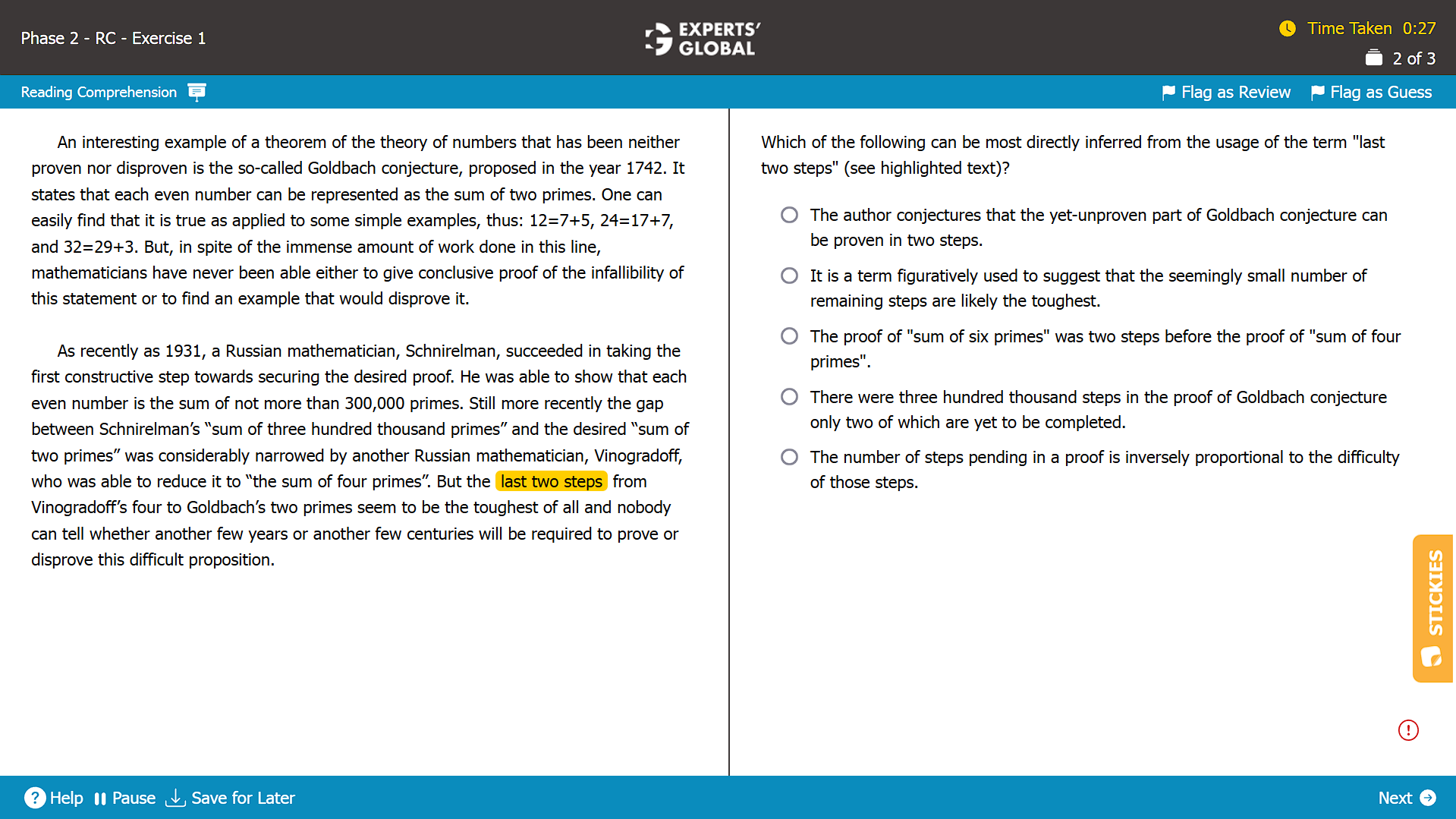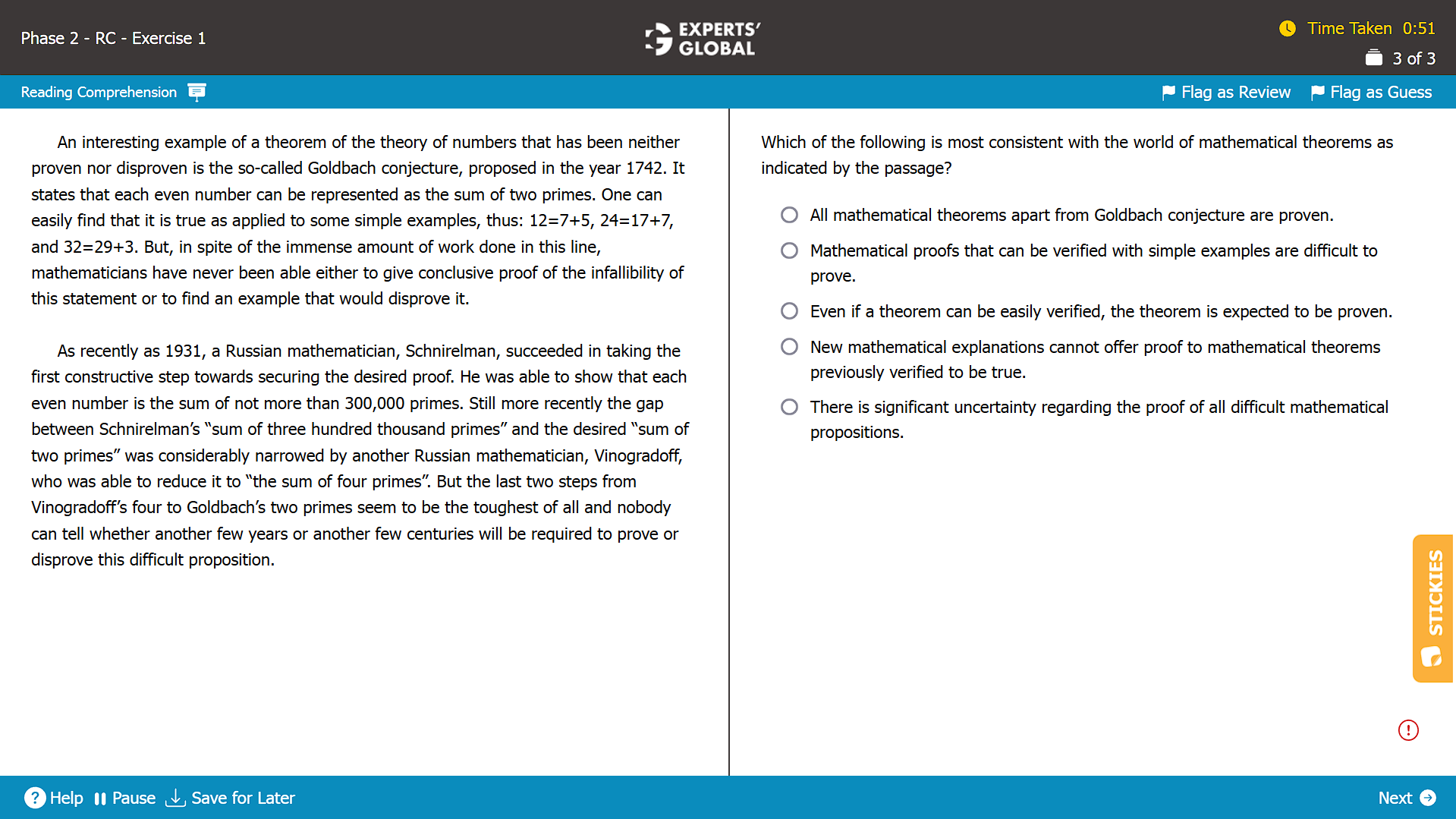Invest 30 seconds...
...for what may lead to a life altering association!
Help Line
- +91.8800.2828.00 (IND)
- 1030-1830 Hrs IST, Mon-Sat
- support@expertsglobal.com
...for what may lead to a life altering association!


Reading Comprehension questions in the GMAT Verbal section test your ability to understand, analyze, and apply information from academic and professional passages. Each passage is followed by 3 or 4 questions. The format evaluates comprehension depth, inference, reasoning, and recognition of key ideas and structure.
To familiarize with all GMAT question types, take a full-length GMAT practice test
Reading Comprehension (RC) questions in the GMAT Verbal section are designed to reflect how professionals extract and apply information from complex written material. Passages are drawn from broad domains such as business management, economics, natural sciences, social sciences, and the humanities. You are required to interpret tone, analyze arguments, draw inferences, and evaluate logical structure. A structured GMAT prep course that builds approach, speed, and reasoning precision for RCs can help significantly. This article explains the format, core skills tested, effective strategies, and common mistakes to avoid, making it a valuable resource whether you are just beginning or working to refine your reading accuracy under time pressure.
Reading Comprehension questions present a passage followed by three or more questions. The passages are usually between 200 and 350 words long and reflect a formal, academic style. Topics can range widely, including business, economics, social theory, or scientific exploration. RC questions may test your understanding of the main idea, supporting ideas, structure of the passage, author’s tone or intent, logical inferences, or the effect of hypothetical changes. Passages are not necessarily business-related. However, they all reflect the complexity and abstract reasoning expected in a graduate-level program. The GMAT uses Reading Comprehension to test whether you can read carefully, extract meaning, and evaluate arguments within a time-bound, high-stakes environment.

Correct Answer: D

Correct Answer: B

Correct Answer: C
Reading Comprehension questions test a set of academic reading skills that are vital to success in business school. These include:
You must identify the central theme of the passage, which may not always be explicitly stated. This tests your ability to synthesize broad meaning from detailed content.
You are expected to deduce conclusions based on the given information. These are not about your opinions but about what logically follows from the text.
You must evaluate whether the author supports, critiques, or remains neutral toward the subject. Recognizing tone is crucial, especially when dealing with abstract or argumentative writing.
You may be asked to identify the purpose of a specific sentence, a paragraph, or even the entire passage. Understanding how each part contributes to the whole helps in answering structure- and function-based questions accurately.
Many questions test your ability to recall or locate specific information within the passage that supports or clarifies a key point.
Some questions test how ideas are organized. You may be asked why the author included a particular example or how one paragraph relates to another.
RC questions are not memory-based questions. The challenge lies in interpreting subtle arguments and applying logic to abstract texts.
The questions following each Reading Comprehension passage fall into several common categories:
These questions ask what the passage is primarily about or what the author’s main goal was in writing it.
These ask about specific information stated in the passage. You must locate the relevant sentence or section and interpret it correctly.
These ask what must be true based on the passage, even if not directly stated.
These ask about the role of a particular paragraph or sentence within the passage.
These ask how the author feels about the subject or what kind of language is used to convey a viewpoint.
For example, a passage may describe a new economic policy in developing countries. Questions might ask what the author thinks about the policy, what evidence supports a certain claim, or what can be inferred if a particular condition changes.
In 2008, we devised the Mind-Map Approach for solving RCs. Since then, the approach has helped 100,000+ students worldwide in navigating the GMAT RCs. We have written a full article on this topic. For a complete walkthrough, please visit: How to Solve Any Reading Comprehension Question on the GMAT

Seek quick GMAT prep? Explore our GMAT crash course
Reading Comprehension success depends not only on strategy but also on avoiding costly habits. Watch out for these common pitfalls:
Some candidates focus too much on remembering each fact and phrase during the initial reading. Instead, aim to grasp the broad flow of the passage—how the content is structured, what the main ideas are, and how they develop. Revisit details only when needed for specific questions.
Skimming can cause you to miss the structure or tone. Speed must follow understanding.
Always go back and verify. Even if you think you remember something, check the text to confirm.
Misreading whether the author is neutral, supportive, or critical can derail your entire answer process.
Some wrong options reuse words from the passage to appear correct. Always evaluate the meaning, not just the wording.
Use only what is in the passage. Do not bring in outside facts or biases.
The preparation for Reading Comprehension questions in the GMAT Verbal section can be organized into three structured stages, what we at Experts’ Global refer to as: Understand, Practice, and Master. Each stage builds a specific reading competency that ensures steady improvement and confidence.
Begin by understanding how GMAT RC passages are constructed. Learn to identify topic sentences, logical transitions, and tone shifts. Familiarize yourself with different question types and how the GMAT tests logic through language. Focus on identifying common traps such as distorted answer choices, extreme wording, or irrelevant facts. Build the skill of reading academic English with precision. A structured GMAT prep course that explains question intent, argument structure, and strategic reading shall provide the right foundation.
Move to consistent practice using high-quality RC passages from official and reliable sources. Time yourself while reading and answering. Practice both short and long passages to build endurance. After solving each passage, spend time reviewing all questions, not just the incorrect ones. Understand what made the correct answer right and the others wrong. Track your mistakes to find whether you struggle with inference, tone, or structure. This phase helps build a systematic approach to reading and answering under time pressure. Use our Missing-Link Approach while solving GMAT RC exercises as well as while attempting GMAT mock tests.
Begin taking full-length Verbal sections and entire GMAT mock tests that include RC passages. Simulate real test conditions. Train your mind to stay sharp through longer passages and back-to-back RC sets. Strengthen your strategies for question elimination, time management, and paragraph mapping. Use your error log to focus on weaker question types. Review regularly and avoid falling back into old habits. At this stage, your focus must shift from solving to solving confidently, without hesitation.
By following this three-stage process of Understand, Practice, and Master, you will build the reading skills needed to tackle GMAT RC passages with precision and control. These questions test your ability to read deeply, reason logically, and apply information quickly. Strong reading comprehension is not just about the Verbal section. It is about thinking clearly under pressure.
An experienced MBA admission consulting team can guide your GMAT preparation and applications with clarity and purpose. Such a team can keep you focused, prevent common mistakes, and share proven strategies. By starting early, you also gain valuable guidance on profile enrichment, ensuring every part of your journey strengthens your application and sets you apart.
Reading Comprehension questions on the GMAT are an essential measure of your ability to absorb, analyze, and apply complex ideas. Business schools expect candidates who can read challenging material and respond with insight. Whether you are reading an economic analysis or a philosophical essay, your ability to understand structure, tone, and logic will set you apart. The key lies in patient reading, clear thinking, and purposeful preparation. With focused effort, you can turn Reading Comprehension into a strength that carries through your GMAT and your career beyond.
Navigate the entire process with our comprehensive GMAT preparation and consulting bundle